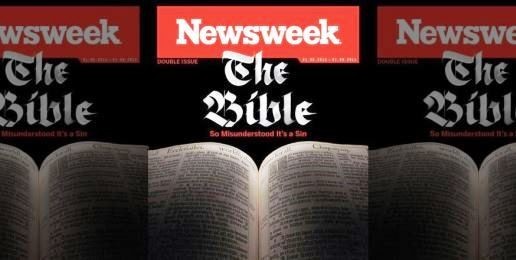
Newsweek magazine – which finally went out of print some time ago, but recently experienced a deep-pocketed resurrection – has graced its readers with a very long cover story on how Christians don’t know anything about the Bible and what they think they know is all wrong. But there’s hope because Newsweek tells us poor Christians what’s what. However, such a task takes world-class hubris and self-delusion as if Christians tried to tell Muslims they have no idea what the Koran actually means, and we do. (I’m not being overly snarky. Skim the article yourself. It’s a Hurricane Sandy of condescension.)
But that’s Newsweek for you. And they’ve done similar cover stories many times prior. The article’s seemingly countless problems can be divided into three general categories:
– The author uses the most extreme and largely unrecognizable caricatures of orthodox Christians as his canvas.
– The author makes simplistic and incorrect arguments about what it is serious Christians actually know about the Scriptures and the church’s ancient history.
– The author baldly creates “facts” ex nihilo about the development and use of Scripture in the Early Church.
Let’s address the major points by category.
I. Wild Caricatures and Oversights
1.) Their story is written about Christians who take the Bible as the reliable, true Word of God, but it characterizes these folks as if they are only American, hyper-conservative, reactionary nit-wits. They miss that Christians who accept the Bible this way live in all nations, represent a great majority of languages and adhere to very different types of political ideas stretching back many millennia, both Jew and Christian. A new low in the art of stereotyping.
2.) The article does not cite one conservative or even widely respected mainstream scholar of the New Testament. The few scholars cited are of the very liberal school of textual criticism. Not that they don’t deserve to be heard, but a good, serious story on this subject – or any – should include a diversity of views for the reader.
3.) It also refers to Christians who take Scripture as the reliable and authoritative Word of God as “biblical literalists.” This is a mistake many people make, but reasonable people should know otherwise. No Christian tradition does or has ever taken the Bible literally.
It is obvious, if we stopped to think about it, that some parts are indeed to be taken literally such as Christ’s claim about himself, “I am the Way, the Truth and the Life” (John 14:6). Others are to be taken as truth indeed, but not literally: “Unless a man be born again, he cannot see the Kingdom of God” (John 3:3). And then some seem to fit in between the literal and the figurative: “I am the light of the world” (John 18:12). The Scriptures are a collection of many types of writing and meaning. There is no excuse for any learned person not knowing this obvious distinction.
II. Simplistic Presentations at Best, Flat Wrong at Worst
1.) The first and grandest overarching mistake the Newsweek author commits is common to such gadflies. The author points out concerns about the “numerous inconsistencies” in the Bible and suggests that those who copied the documents from generation to generation made mistakes (or added things) in their transcriptions.
Truth: This is not news. Christians have long been aware of these seeming difficult valleys in the biblical texts and have worked through them carefully with serious scholarship for the last two hundred years or longer. These points are certainly not faith-wrecking problems. Most of the changes and insertions are minor or inconsequential, as the article points out.
2.) Newsweek also explains that there are troubling differences about Christ in the Gospels, stories in some books that are not in the others or they present the stories in different ways with different facts. They call this “playing telephone” with the Bible.

Examples concern Jesus’ birth and resurrection in which different writers provide facts that others do not. The article explains that “In creating the familiar Christmas tale, Christians took a little bit of one story, mixed it with a little bit of the other and ignored all the contradictions….”
Truth: The same is true if you want to know about any incident, say the facts of what happened on 9/11. The New York Times’ reporting on 9/11 includes facts that are both missing and different in ways from those reported by the Los Angeles Times. But readers don’t question the reliability of either because they accentuate or leave out various points of the story. One seeking a true and detailed story of what happened on the morning of 9/11 draws from various sources and puts these different and unique reports together into a bigger, truer picture. It is what good journalists do in their own reporting.
Thus, the seeming “contradictions” in Matthew, Mark, Luke and John give various parts of Christ’s story in their own ways from their own vantage points. Collectively, they give us a fuller picture. People know this.
3.) The author also makes the outlandishly provocative claim that “no television preacher has ever read the Bible. Neither has any evangelical politician. Neither has the pope.” What he’s getting at is that the Bible we have today is not the exact text the original writers created, so today we read “a fundamentally flawed document.”
Truth: First, it is a ridiculous quibble. Very few Christians are shocked to learn there are differences between an original manuscript and one transferred over the centuries. But are those differences enough to conclude that our Bible today is a “fundamentally flawed document”? Of course not.
One would have to say no one has ever read Aristotle’s work or Homer’s Odyssey because what the texts we have today are not what these authors actually wrote but are instead “fundamentally flawed documents.” Actually more so in that these documents are much older than the New Testaments writings and have been transferred for much longer. But scholars of these texts – and most other major ancient texts – don’t believe or explain to their students that seeking to understand what the authors truly meant is a fool’s errand.
God has not been helpless in preserving His holy Word through time. As it was first given to His people in Hebrew and Greek, He wasn’t caught by surprise that it would need copying and translating throughout time for all peoples. Obviously He chose to do it this way through the work of His people as we don’t get new editions sent down like manna from Heaven. If He’s good with this process, so too can we be.
4.) Newsweek also wants Christians to know that biblical authenticity is not possible because some Greek words don’t have precise equivalents in the languages into which it is being translated.
Truth: How many have heard your pastor explain a particular text and say, “Now, the original Greek word here doesn’t have a precise English equivalent, but it generally means (this) or could mean (this, this or this)”? Newsweek would have us believe your pastor is unwittingly pointing out the unreliability of Scripture, rather than just simply explaining the difficulty of translating the text from one very different language to another. And Newsweek is certainly smart enough to appreciate that if this is a debilitating problem for the reliability of Scripture, it is also one for any text translated from an ancient language, much less any language at all. Yes, words from language to language don’t translate cleanly. Not news, or a problem.
5.) They correctly note that most congregations hold to and even recite the Nicene Creed each Sunday in their services. But they insist, “It is doubtful many of them know the words they utter are not from the Bible.”
Truth: This one is just embarrassing. It is doubtful most of them don’t know this. Newsweek should have just asked around.
6.) Then they drop this bomb on good Christians as if it’s also faith-challenging: The Sabbath – as Christians generally practice it – is not actually Sunday but the last day of the week, Saturday. Newsweek tells us:
“The word Sunday does not appear in the Bible, either as the Sabbath or anything else. But four years before Nicaea, Constantine declared Sunday as a day of rest in honor of the sun god.”
Truth: First, Christians indeed do and have always well realized that our holy day is the day after the Jewish Sabbath. And it happened long before the Council of Nicaea and Constantine. This is obvious. The first day of the week (as the New Testament refers to it time and again) became our day of rest and worship because our Savior was resurrected on this day. He also first appeared to the disciples after his resurrection on this day and commissioned them to found His church, breathing upon them the Holy Spirit (John 20:19-23). And Acts 20:7-8 notes the meeting and communion day for Christians was the first day of the week.
Additionally, the very Early Church leaders tell us the first day of the week was sacred to the church, their special day. One such example is Ignatius. On his way to his martyrdom in Rome (and Onesimus, Paul’s dearly beloved friend from Philemon joined him in this journey to encourage and minister to him) Ignatius wrote to the church in Magnesia and explained, “Those then [the followers of Christ] who lived by ancient practices arrived at a new hope. They ceased to keep the Sabbath and lived by the Lord’s Day, on which our life as well as theirs shone forth…” (Letter to the Magnesians v. 9)
It is an utter, although long repeated myth that Constantine declared the first day of the week as the day on which the church would worship. What he did was name it Sunday as a civil holiday, thus Christianizing that pagan day of the Sun as the Son’s day. But Christians held it as their holy day from the church’s founding.
7.) Next Newsweek informs its readers that the birth of Christ was not actually December 25th but later moved to that day to satisfy a significant pagan holiday.
Truth: Likewise, it is no secret to most Christians that December 25th is likely not the actual day of Christ’s birth. The exact date of this great day is not mentioned in either scriptures or the early documents of the church. No secular accounts give the date either. No one knows.
There is even evidence by some Early Fathers that the birth of Christ was not even celebrated by the church in its early years. And records show that Early Fathers consider our Lord’s birth could have been on many different days; some among those considered are on our calendars – May 20, March 21 and April 15, 20 or 21. But by the fourth century, December 25 became the date celebrated in the Western church and January 6 in the Eastern Church. The span between these two dates is our 12 days of Christmas.
The theory that this time of year was chosen because it coincided with a major pagan festival is very doubtful. No early documents indicate this and the tale appears to have first arisen in the twelfth century, a long, long time after its establishment and practice by the Church.
8.) Their article presents two additional “challenges” to confidence in the Scriptures that are so ridiculous any serious high-school Bible student can explain them. One, that there is no clear understanding – as well as seemingly contradictory tellings – of the important topic of when and how Christ will return. Second, that there seemingly two different creation stories in Genesis 1 and 2.
Truth: Does it really need an explanation? For the second point, see the explanation regarding the New York and Los Angeles Times above.
9.) And the last for this category is a doozy. Newsweek says “fundamentalists Christians” want certain people condemned to hell – homosexuals and the like – but that their wishes will hit a snag because “if they accept the writings of Paul and believe all people are sinners, then salvation is found in belief in Christ and the Resurrection. For everyone. There are no exceptions in the Bible for the sins that evangelicals really don’t like. So apparently, God doesn’t need the help of fundamentalists in determining what should be done in the afterlife with the prideful, the greedy, the debaters or even those homosexuals.”
Truth: They actually got this point exactly right despite so badly misunderstanding one of the basic tenets of evangelical theology, the great hope and essence of the universal Christian faith: Christ came to die for sinners. All sinners, offering salvation to each one who repent and seek him, regardless of their story.
III. Just Plain Wrong or Made-Up
1.) Newsweek’s biggest mistake goes right to the heart of what Christianity believes and has consistently proclaimed: That Jesus is God and the second divine person of the Trinity. Their article claims the texts saying Jesus is God have nothing to do with the Greek texts and that “modern translators pretty much just invented the words.” Regarding the Trinity, they offer their readers the tired and incorrect explanation that because the word never appears in the Bible it’s not biblical.
Truth: Both of these ideas – that Jesus was God and the nature of the Trinity – were not made up in later years by unscrupulous translators. The claim is fantastical. The first truths the Early Fathers of the Church sought to teach and defend passionately against rising heretics are these two:
 Jesus is God: Some heretics taught that Jesus – a real flesh and blood man who was born an earthly birth and slaughtered on a cross – was not God at all and couldn’t possibly be. These were the Arianists, Docetists and the Gnostics. A great deal of energy was put forth in the early centuries of the church to make sure that the divinity of Jesus – both fully God and fully man – was adhered to and faithfully passed on church by church. Even the most basic understanding of church history gets this.
Jesus is God: Some heretics taught that Jesus – a real flesh and blood man who was born an earthly birth and slaughtered on a cross – was not God at all and couldn’t possibly be. These were the Arianists, Docetists and the Gnostics. A great deal of energy was put forth in the early centuries of the church to make sure that the divinity of Jesus – both fully God and fully man – was adhered to and faithfully passed on church by church. Even the most basic understanding of church history gets this.
Trinity: To charge that the Trinity is not a genuinely Christian truth because the word itself never appears in Scripture is as simplistic as it is wrong. Many fundamental concepts are deeply biblical even if the words to describe them never appear there. Just one example concerning the Trinity is Matthew 28:19 even though it was Tertullian who first used the word to explain this fundamental Christian truth around 200-220 AD. As with the divinity of Jesus, the Early Fathers vigorously taught and defended the Triune nature of God against those who denied it. Nearly all the early creeds of the church proclaimed it as well.
2.) They also claim that the Early Church “butchered Christians” who did not agree with the doctrine of the Trinity, or taught that Jesus was not God or would not sign onto the Nicene Creed. And they claim that the Emperor Constantine, after his conversion, committed the same atrocities as well. Newsweek states outright that “In fact, Christians are believed to have massacred more followers of Jesus than any other group or nation.”
Truth: This is just embarrassing.
3.) Newsweek again demonstrates a dramatic lack of understanding of basic Christian theology and history by stating, “About 50 years later, in A.D. 381, the Romans held another meeting, this time in Constantinople. There, a new agreement was reached—Jesus wasn’t two, he was now three—Father, Son and Holy Ghost.”
Truth: Now one might just start to feel sorry for Newsweek.
4.) But wait, there’s more…
“… and several books of the New Testament, including some attributed to Paul, are now considered forgeries perpetrated by famous figures in Christianity to bolster their theological arguments. It is small wonder then that there are so many contradictions in the New Testament.”
Truth: The author offers no explanation of who these “famous figures” are, what changes they made to the Scriptures or what novel theological ideas they were seeking to insert. He can’t because they don’t exist. More stuff just made up.
5.) Also, Newsweek says that in the early decades of the church, “there were no universally accepted manuscripts that set out what it meant to be a Christian, so most sects had their own gospels.”
Truth: Not even close. A canon of scripture – the New Testament as we have it today – was not settled upon until quite sometime after the founding of the Christian Church, but there were indeed accepted and reliable manuscripts that the church made regular use of. Many of these became the New Testament. Others did not, like the first and second letters of Clement, the Didache as well as the writings of Polycarp and Ignatius for example. These were widely taken by the church at large as reliable and beneficial for teaching what it means to be a faithful Christian as we might use the writings of Calvin, Edwards, Moody, Bonhoeffer, Lewis, Schaeffer and others today. Are they sacred? Of course not, but they are solid teachings that are useful to and appreciated in most churches.
There were indeed universally accepted manuscripts used regularly by the church from earliest days and there was little tussle over these. Churches certainly did not have their own unique manuscripts teaching many different, much less conflicting, things.
And the silliness just continues page after page; Christians getting the Scriptures plain wrong regarding homosexuality, flouting Christ’s command to not pray in public etc. The article never does improve in its reasoning, arguments or seriousness of scholarship.
It is certainly not being mean, cheap or unfair to say this major front-page article from an otherwise serious newsweekly is less thoughtful or burdened with any manner of truth than one would expect to find in a screed by the village atheist in one’s local alternative give-away weekly. Newsweek just provides us a longer version of it
And the only reason this one is worth responding to is because of who published it and how widely it will, unfortunately, be read.























